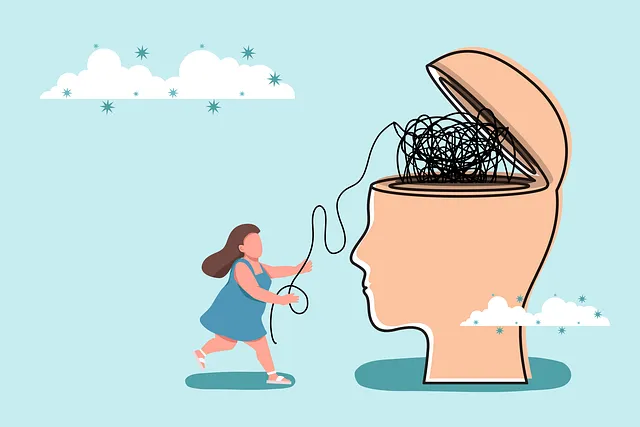Highlands Ranch Kaiser Permanente behavioral health services prioritize cultural sensitivity to offer equitable, effective care. By recognizing and respecting diverse traditions and practices, they create safe spaces that foster trust and open communication. This holistic approach incorporates culturally relevant techniques, mindfulness meditation, and a podcast series to address mental health needs across various backgrounds. Measuring success involves evaluating client outcomes like improved access, satisfaction, and retention among diverse ethnic groups, ensuring inclusive services tailored to unique cultural contexts.
Cultural sensitivity is a cornerstone in providing effective mental healthcare, especially within diverse communities. This article explores the impact of cultural diversity on mental health and its role in shaping treatment outcomes. We delve into practical approaches, ethical considerations, and successful implementation strategies, focusing on Highlands Ranch Kaiser Permanente Behavioral Health Services as a model for culturally competent care. By examining these aspects, we aim to highlight the importance of cultural sensitivity in improving patient experiences and outcomes.
- Understanding Cultural Diversity and Its Impact on Mental Health Care
- The Role of Cultural Sensitivity in Effective Treatment Approaches
- Navigating Ethical Considerations: Ensuring Respectful Patient-Provider Interactions
- Incorporating Cultural Competence into Highlands Ranch Kaiser Permanente Behavioral Health Services
- Measuring Success: Evaluating the Effectiveness of Cultural Sensitive Practices
Understanding Cultural Diversity and Its Impact on Mental Health Care

In today’s diverse society, mental healthcare providers must embrace cultural sensitivity to offer effective and compassionate services, such as those provided by Highlands Ranch Kaiser Permanente behavioral health professionals. Recognizing and appreciating cultural differences is not merely a nice-to-have but a necessity for ensuring equitable care. Every community has its unique traditions, beliefs, and practices that shape individuals’ experiences of mental illness and their journeys to recovery. Understanding these nuances enables healthcare workers to create safe spaces where patients feel heard, respected, and understood.
Cultural diversity impacts mental health in profound ways. For example, certain communities may have specific expressions of distress or unique coping mechanisms that are not immediately recognizable to providers from different backgrounds. Additionally, the Mental Illness Stigma Reduction Efforts can vary across cultures, influencing how individuals seek help and perceive treatment. Building Empathy by adopting Self-Esteem Improvement strategies that acknowledge and value diverse cultural perspectives is key to fostering trust and encouraging open communication. This approach allows for a more nuanced understanding of patients’ lives, their support systems, and the environmental factors that contribute to their mental well-being.
The Role of Cultural Sensitivity in Effective Treatment Approaches

In the diverse communities served by Highlands Ranch Kaiser Permanente behavioral health services, cultural sensitivity is a cornerstone for effective treatment approaches. Understanding and respecting patients’ unique cultural backgrounds, values, and beliefs can significantly enhance therapy outcomes. This nuanced approach ensures that mental healthcare is tailored to meet individual needs, fostering trust and open communication between patient and provider. By integrating cultural awareness into practice, healthcare professionals can address not only the symptoms of mental health conditions but also the underlying social and cultural factors that contribute to them.
Cultural sensitivity plays a pivotal role in promoting positive thinking, stress management, and mood management. Recognizing that different cultures have distinct ways of expressing and interpreting emotions allows mental health specialists to adapt their interventions accordingly. This personalized approach not only improves patient satisfaction but also increases the likelihood of adherence to treatment plans. By embracing cultural diversity, Highlands Ranch Kaiser Permanente behavioral health services strive to create an inclusive environment where every individual feels heard, understood, and supported in their journey towards better mental well-being.
Navigating Ethical Considerations: Ensuring Respectful Patient-Provider Interactions

In the realm of mental healthcare, ethical considerations are paramount, especially when interacting with a diverse patient population. At Highlands Ranch Kaiser Permanente behavioral health services, navigating these intricacies is crucial to foster a safe and respectful environment for all individuals seeking support. Cultural sensitivity requires understanding and appreciating each patient’s unique background, beliefs, and experiences, which can shape their perception of mental illness and treatment preferences.
For instance, when providing Trauma Support Services, it becomes essential to employ Mind Over Matter Principles that transcend cultural boundaries. This involves adapting therapeutic approaches to align with the patient’s comfort levels, incorporating culturally relevant techniques, and ensuring clear communication. By integrating these principles, healthcare providers can effectively connect with patients from various walks of life, offering personalized care tailored to their specific needs. Additionally, the Mental Wellness Podcast Series Production can serve as a powerful tool to engage diverse audiences by sharing stories that resonate with different cultural narratives, thereby promoting understanding and reducing stigma.
Incorporating Cultural Competence into Highlands Ranch Kaiser Permanente Behavioral Health Services

Highlands Ranch Kaiser Permanente Behavioral Health Services has made significant strides in integrating cultural competence into its practice. This involves a deep understanding and respect for the diverse backgrounds, beliefs, and values of the individuals they serve. By incorporating self-awareness exercises and emotional well-being promotion techniques, the services aim to create a safe and inclusive environment where every patient feels heard and validated.
The team at Highlands Ranch Kaiser Permanente recognizes that cultural sensitivity is not just about diversity; it’s about equity in care. They facilitate Mindfulness Meditation sessions as part of their holistic approach, enabling patients to connect with their inner selves while fostering resilience. This comprehensive strategy ensures that the behavioral health services not only address immediate mental health concerns but also promote long-term well-being by acknowledging and respecting cultural identities.
Measuring Success: Evaluating the Effectiveness of Cultural Sensitive Practices

Measuring success in cultural sensitivity within mental healthcare practices is a multifaceted process that goes beyond simple numbers. It involves evaluating how effectively services like those offered by Highlands Ranch Kaiser Permanente behavioral health services are integrating and adapting to diverse cultural needs. This includes assessing client outcomes, such as improved access to care, enhanced satisfaction levels, and increased retention rates among various ethnic and cultural groups.
For instance, the implementation of self-awareness exercises tailored to different cultural contexts can be assessed by gauging clients’ perceptions of safety and acceptance. Similarly, trauma support services can be evaluated through client feedback on their ability to address past traumas within a culturally sensitive framework. Moreover, tracking the development of self-care routine habits for better mental health among diverse populations provides tangible evidence of successful cultural sensitivity initiatives.
Cultural sensitivity in mental healthcare is not just a preference, but an essential component for effective treatment. As seen through the successful implementation at Highlands Ranch Kaiser Permanente behavioral health services, embracing cultural competence can lead to improved patient outcomes and stronger provider-patient relationships. By understanding diverse cultural backgrounds and incorporating ethical considerations, mental health professionals can create inclusive environments that honor individual identities. Measuring success through evaluation ensures continuous improvement in delivering culturally sensitive practices, ultimately fostering better mental well-being across all communities served.






